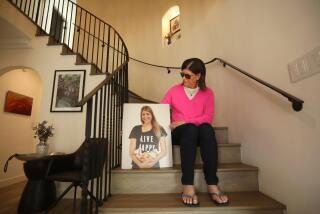As Debi French and Her Family Have Found Out, TB Is No Disease of the Past : Fighting a Formidable Foe
- Share via
WESTMINSTER — Patti French remembers that when she learned that her 17-year-old daughter, Debi, had tuberculosis last May, she was relieved that the severe weight loss, lung congestion and paleness were not symptoms of something worse.
“I thought, ‘Thank God, we can deal with this and get her well,’ ” French said.
But over the past year, the French family has discovered to its dismay that tuberculosis--on the verge of extinction in the United States just a decade ago--can be a formidable foe.
Debi, now 18, who has suffered a relapse, on Tuesday will have a third of her right lung removed at National Jewish Center for Immunology and Respiratory Medicine in Denver, a major international center for treating people with drug-resistant TB. The operation, being performed to remove the TB bacteria from her body, is expected to greatly increase her chances for a full recovery, doctors say.
Debi is one of 17 La Quinta High School students to have contracted the disease since 1991. Health officials have determined that 12 of the students, Debi among them, acquired a drug-resistant strain of TB. County officials say the other 11 responded well to modern medications that are the first line of therapy for drug-resistant strains.
At first Debi, too, seemed to respond well to drug therapy. Her mother said a family physician suspected that Debi had TB after her bronchitis-like symptoms persisted despite medical treatment. A chest X-ray confirmed his suspicions.
Patti and her husband, Fred, said they also notified officials at La Quinta and kept Debi out of school for six weeks while she took antibiotics. “She felt better immediately,” Patti French recalled.
Debi was able to go to summer camp and to join the rest of the La Quinta senior class in the fall, her parents said. Her doctor thought her progress so satisfactory that he was prepared to recommend that she discontinue treatment, they said. In February, however, Debi tested positive for TB bacteria in a sputum screening. Debi took further medications, but the bacteria in her lungs quickly multiplied.
At the recommendation of county health officials, the Frenches said, Debi was admitted to UCI Medical Center in Orange for intense intravenous drug therapy; she then continued to receive the therapy at home with the help of visiting nurses.
At the end of March, a sputum culture showed that the TB strain Debi had had become immune to all first-line medications.
“It was very frightening,” her mother recalled. “I knew all along that if TB progresses far enough, it can kill you.”
Dr. Jodi Meador, tuberculosis controller with the Orange County Health Care Agency, said it will never be known for sure why Debi’s relapse involved a TB strain even more drug-resistant than the one she originally became infected with. Meador said this kind of relapse most commonly occurs when a patient does not take medications as prescribed. But Debi and her parents say she was very careful to take her pills.
Another possibility, Meador said, is that Debi was not prescribed medications in sufficient doses. Debi’s doctor said that sometimes TB bacteria may inexplicably spontaneously mutate to a more drug-resistant form.
Debi’s parents said county health officials then advised them to send Debi to the Denver hospital. For the trip, Debi had to travel by private jet because her condition was contagious. In fact, the first pilot contacted refused the job for fear of catching TB, they said. Patti French and her daughter boarded a plane to Denver April 5.
There, Patti French said, Debi was placed on a regimen of older TB drugs that have can have serious side effects but that seem to be working. The only side effect Debi has experienced, her mother said, is a brown tinge to her skin that looks like a tan.
Five weeks ago, Debi’s sputum tests began to test negative, showing that the bacteria in her lungs were on the decline. By next week a culture will show whether she is clear of active disease. Nonetheless, the disease-damaged upper lobe of her right lung, where most of the TB bacteria are concentrated, will be removed to increase her chances of recovery.
Dr. James Cook, head of the infectious diseases division at the National Jewish Center, said: “We are hoping her surgery will get rid of disease on the right side (of her lungs) and antibiotics will take care of the rest.”
After the operation, health officials said, Debi will not be contagious, but she will need to continue taking antibiotics for three years. During that time, she will be given regular sputum tests to make sure she does not suffer another relapse.
Debi, interviewed in Denver by telephone, says she is eager to put the illness behind her. “Anybody would be scared by having something cut out, but I am anticipating going home. I miss my school, my friends and family and all the activities,” said the onetime high-school flag twirler. She says she hopes to return to school in the fall.
Her parents said Debi, who also had been active in the school choir and a member of a church band, has suffered psychologically in being away from her friends and school.
“For a high schooler, the isolation is overwhelming,” Patti French said. Some of Debi’s friends have been afraid of catching TB from her, and one fearful friend initially refused even to talk to Debi on the telephone, her mother said.
Tuberculosis has been on the upswing for several years, health authorities say, because of several factors. These include an increase in immigration from Third World countries where the disease is endemic, lack of experience among the medical community in recognizing and treating it, and the difficulty in persuading infected individuals to take their medication consistently.
“We had tuberculosis in the 19th Century. It shouldn’t be happening in the 20th Century,” said Debi’s father, Fred French. “I think it is important that people realize that something we thought was history is not.
“It is happening right now and we need to educate ourselves to the fact that proper treatment is the only cure. We can’t go at it halfheartedly. There needs to be an all-out effort with everybody--the schools and medical people--involved.”
More to Read
Sign up for Essential California
The most important California stories and recommendations in your inbox every morning.
You may occasionally receive promotional content from the Los Angeles Times.













